-
 Bitcoin
Bitcoin $83,679.4949
-4.24% -
 Ethereum
Ethereum $1,879.8730
-6.62% -
 Tether USDt
Tether USDt $0.9993
-0.06% -
 XRP
XRP $2.1765
-7.55% -
 BNB
BNB $620.3856
-3.09% -
 Solana
Solana $129.2402
-7.23% -
 USDC
USDC $0.9999
0.00% -
 Dogecoin
Dogecoin $0.1798
-6.35% -
 Cardano
Cardano $0.6967
-5.51% -
 TRON
TRON $0.2334
-0.45% -
 Toncoin
Toncoin $3.8449
-1.85% -
 Chainlink
Chainlink $14.1201
-9.26% -
 UNUS SED LEO
UNUS SED LEO $9.7089
-0.56% -
 Stellar
Stellar $0.2716
-5.48% -
 Avalanche
Avalanche $19.8710
-10.02% -
 Sui
Sui $2.5111
-9.34% -
 Shiba Inu
Shiba Inu $0.0...01320
-6.67% -
 Hedera
Hedera $0.1807
-6.19% -
 Polkadot
Polkadot $4.2861
-6.86% -
 Litecoin
Litecoin $86.5710
-7.05% -
 MANTRA
MANTRA $6.2994
-3.30% -
 Bitcoin Cash
Bitcoin Cash $306.9623
-5.31% -
 Bitget Token
Bitget Token $4.7685
-4.35% -
 Pi
Pi $0.8251
0.13% -
 Dai
Dai $0.9998
-0.02% -
 Ethena USDe
Ethena USDe $0.9988
-0.03% -
 Hyperliquid
Hyperliquid $13.2221
-9.19% -
 Monero
Monero $216.2535
-3.28% -
 Uniswap
Uniswap $6.0959
-9.95% -
 Aptos
Aptos $5.5366
-6.67%
How to deal with smart contract interaction failure when transferring money through Ethereum wallet?
Ethereum smart contract failures during money transfers often stem from insufficient gas, incorrect contract addresses, or coding errors; thorough checks and understanding of gas fees are crucial for successful transactions.
Mar 24, 2025 at 11:21 pm
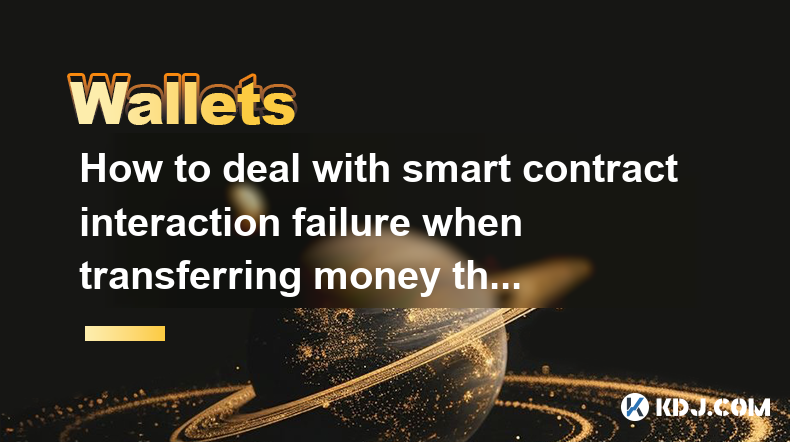
How to Deal with Smart Contract Interaction Failure When Transferring Money Through Ethereum Wallet?
Transferring funds via Ethereum smart contracts offers efficiency and automation, but it also introduces potential failure points. Understanding these points and how to troubleshoot them is crucial for successful transactions. Failures can stem from various sources, ranging from insufficient gas fees to incorrect contract addresses or coding errors within the smart contract itself. This article explores common causes and solutions for smart contract interaction failures during Ethereum transactions.
One common reason for failure is insufficient gas. Gas represents the computational effort required to execute a smart contract. If you don't provide enough gas, the transaction will fail before completion. Always ensure you've set a sufficient gas limit, potentially exceeding the estimated amount to account for unexpected complexity. Many wallets provide gas estimation tools, but it's wise to add a buffer.
Another frequent issue is an incorrect smart contract address. A single typo in the address will render the transaction invalid. Double, and triple, check the address before confirming the transaction. Use a reputable source for the contract address to minimize the risk of errors. Copy and paste directly from the verified source to avoid manual input errors.
Problems can also originate from the smart contract's code itself. Bugs, vulnerabilities, or poorly written code can cause unexpected failures. Before interacting with an unknown contract, carefully review its code (if available) or seek community feedback on its reliability. Avoid interacting with contracts lacking transparency or a verifiable audit.
Network congestion can also hinder transactions. During periods of high network activity, transactions might take longer to process or even fail. Consider increasing the gas price to incentivize miners to prioritize your transaction. However, be mindful of excessively high gas prices, as this could lead to unnecessarily high fees.
Sometimes, the failure is due to a problem with your Ethereum wallet. Ensure your wallet is properly connected to the network and has sufficient funds. Also, check your wallet's software version; outdated software might have compatibility issues with certain smart contracts.
Here's a step-by-step guide on how to troubleshoot smart contract interaction failures:
- Verify the Smart Contract Address: Double-check the address for typos and ensure it's sourced from a trusted location.
- Check Gas Limits and Prices: Adjust gas limits and prices based on network conditions. Use the wallet's estimation tool, but add a buffer for safety.
- Review the Smart Contract Code (if possible): Inspect the code for potential vulnerabilities or errors if you have access.
- Check Your Wallet's Connection and Balance: Ensure your wallet is connected to the correct network and holds enough ETH to cover the transaction fees and the intended transfer amount.
- Examine the Transaction Details: Your wallet should provide transaction details; review error messages for clues.
- Consult Community Forums or Support: If you're still facing issues, seek assistance from the relevant community forums or support channels for the smart contract or wallet.
- Wait for Network Congestion to Subside: If network congestion is the issue, wait for a period of lower network activity before retrying the transaction.
- Consider Using a Different Wallet: In rare cases, incompatibility between your wallet and the smart contract might cause failures. Try a different wallet.
Common Questions and Answers:
Q: What does "out of gas" mean in an Ethereum transaction?
A: "Out of gas" means you did not provide enough gas to complete the smart contract execution. The transaction was aborted before it could finish. Increase the gas limit and retry.
Q: How do I find the correct gas price?
A: Your wallet typically provides gas price estimations. You can also use online tools that display current gas prices. Remember that higher gas prices increase transaction speed but also increase fees.
Q: Why might a smart contract revert a transaction?
A: A smart contract might revert due to internal logic errors, insufficient funds in the contract, or failing a specific condition within the contract's code. Check the transaction details for error messages.
Q: What should I do if I see an error message I don't understand?
A: Search the error message online. Many common errors have explanations available in online forums and documentation. You can also seek help in relevant community forums or from developers familiar with the smart contract.
Q: Is it possible to recover funds lost due to a smart contract failure?
A: Recovering lost funds depends on the cause of the failure. If the failure was due to a bug in the contract, recovery might be impossible. If the issue was due to user error (like an incorrect address), recovery might be more feasible, but it depends on the specific circumstances and whether the funds are still accessible.
Q: How can I prevent smart contract interaction failures in the future?
A: Always double-check the smart contract address, carefully estimate gas, review the contract's code if possible, and use a reputable wallet. Stay informed about network congestion and adjust your transactions accordingly. Consider using test networks to test transactions before committing real funds.
Q: What are the best practices for interacting with smart contracts?
A: Thoroughly research any smart contract before interacting with it. Check for audits, community reviews, and the code itself (if available). Start with small test transactions on a testnet before committing significant funds on the mainnet. Always double-check all inputs before confirming a transaction. Understand the implications of the smart contract’s functionality before engaging with it.
Disclaimer:info@kdj.com
The information provided is not trading advice. kdj.com does not assume any responsibility for any investments made based on the information provided in this article. Cryptocurrencies are highly volatile and it is highly recommended that you invest with caution after thorough research!
If you believe that the content used on this website infringes your copyright, please contact us immediately (info@kdj.com) and we will delete it promptly.
- As Bitcoin sways like a ship in a macroeconomic storm, the threshold of $84,000 becomes a symbol of resistance.
- 2025-03-29 03:40:12
- GameStop plans to close more stores and turn its attention to cryptocurrency as the company begins investing in Bitcoin.
- 2025-03-29 03:40:12
- US President Donald Trump Plans to Meet with El Salvador President Nayib Bukele at the White House Next Month
- 2025-03-29 03:35:12
- Solana (SOL) Navigates a Pivotal Decision Point That Could Determine Its Next Major Move
- 2025-03-29 03:35:12
- The recent scrutiny of Cardano's native token, ADA, raises critical questions about its viability amidst escalating competition in the crypto space.
- 2025-03-29 03:30:12
- XploraDEX Is Witnessing a Breakout Moment as Investor Enthusiasm for the $XPL Token Soars
- 2025-03-29 03:30:12
Related knowledge
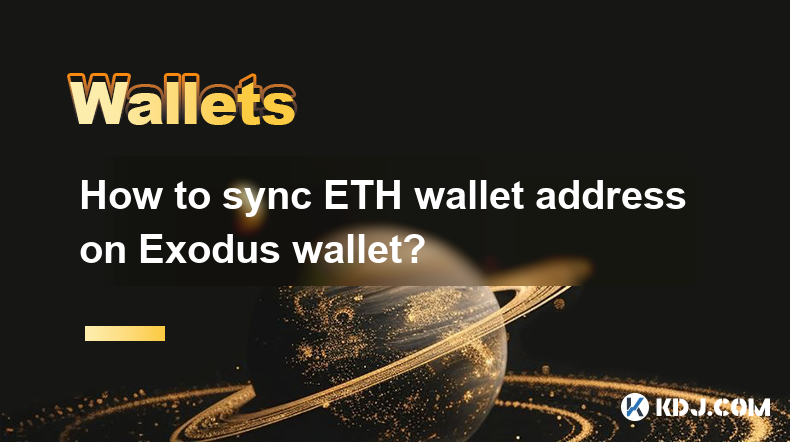
How to sync ETH wallet address on Exodus wallet?
Mar 29,2025 at 02:00am
Understanding Exodus Wallet and Ethereum IntegrationExodus is a popular multi-cryptocurrency wallet known for its user-friendly interface. It supports a wide range of cryptocurrencies, including Ethereum (ETH). Syncing your ETH wallet address within Exodus simply means ensuring your wallet is connected to the Ethereum blockchain and can display your ET...
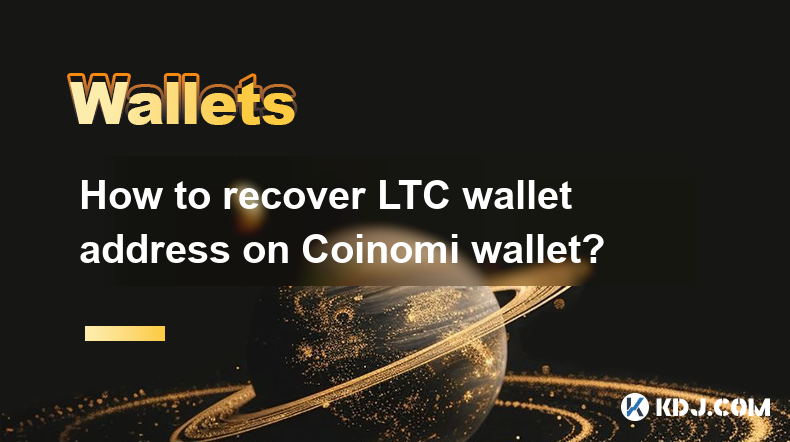
How to recover LTC wallet address on Coinomi wallet?
Mar 29,2025 at 01:35am
How to Recover Your Litecoin (LTC) Wallet Address on Coinomi Wallet Understanding Coinomi's Wallet Address SystemCoinomi is a multi-currency wallet, meaning it supports numerous cryptocurrencies, including Litecoin (LTC). Unlike some wallets that generate a new address for each transaction, Coinomi typically provides you with a single, primary LTC recei...
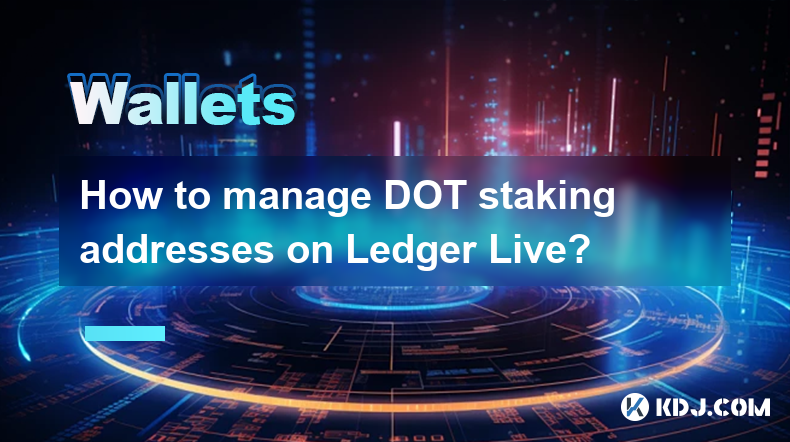
How to manage DOT staking addresses on Ledger Live?
Mar 29,2025 at 02:14am
Understanding DOT Staking and Ledger Live IntegrationPolkadot (DOT) staking allows users to lock up their DOT tokens to secure the network and earn rewards. Ledger Live, a user-friendly interface for managing Ledger hardware wallets, offers a convenient way to interact with your DOT holdings, including staking. However, it's crucial to understand that ...
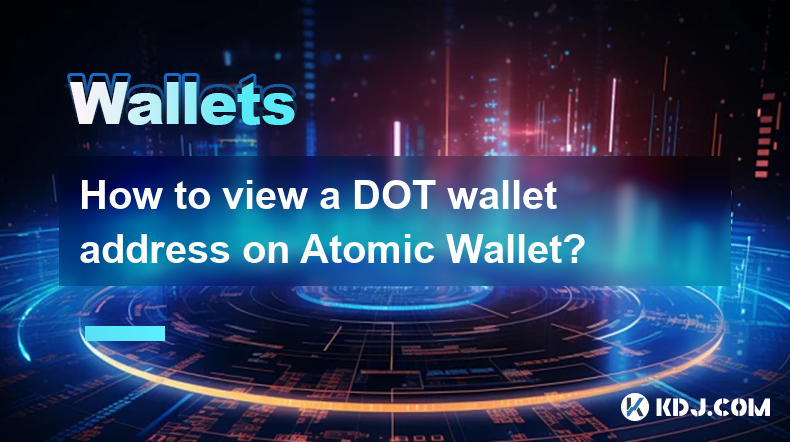
How to view a DOT wallet address on Atomic Wallet?
Mar 29,2025 at 01:50am
Locating Your Polkadot (DOT) Wallet Address in Atomic WalletAtomic Wallet is a popular multi-currency wallet that supports Polkadot (DOT). Finding your DOT address within the wallet is straightforward, but requires understanding the wallet's interface. This guide will walk you through the process step-by-step. Remember, your DOT address is crucial for ...
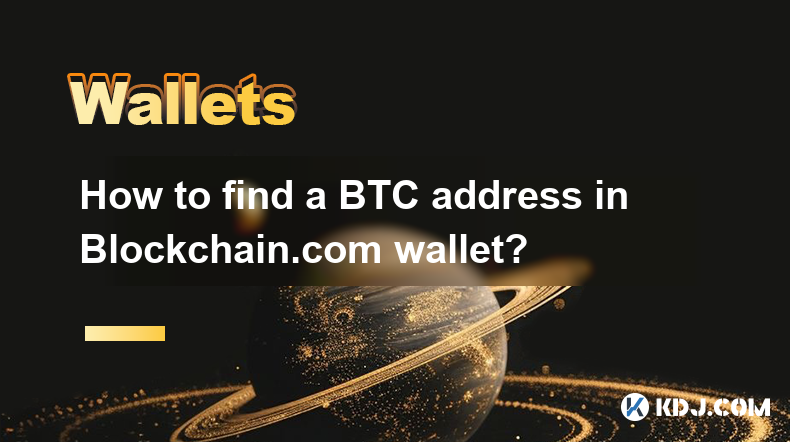
How to find a BTC address in Blockchain.com wallet?
Mar 29,2025 at 03:42am
Locating Your Bitcoin Address on Blockchain.comBlockchain.com is a popular cryptocurrency wallet and exchange. Finding your Bitcoin (BTC) address within the platform is straightforward, but understanding where to look depends on whether you're receiving or sending BTC. The process differs slightly depending on your specific needs. First, ensure you're ...
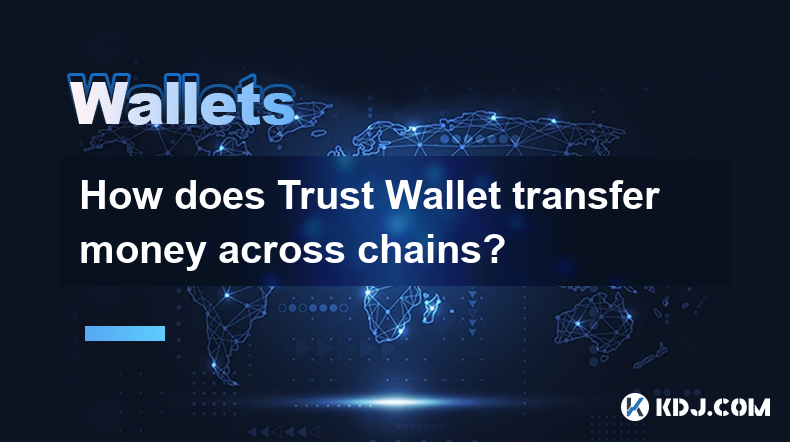
How does Trust Wallet transfer money across chains?
Mar 28,2025 at 10:49pm
Understanding Cross-Chain Transfers with Trust WalletTrust Wallet doesn't directly 'transfer money' in the traditional sense. Instead, it facilitates the movement of cryptocurrency assets between different blockchains. This process, known as a cross-chain transfer, involves several steps and often utilizes intermediary protocols or bridges. Understandi...

How to sync ETH wallet address on Exodus wallet?
Mar 29,2025 at 02:00am
Understanding Exodus Wallet and Ethereum IntegrationExodus is a popular multi-cryptocurrency wallet known for its user-friendly interface. It supports a wide range of cryptocurrencies, including Ethereum (ETH). Syncing your ETH wallet address within Exodus simply means ensuring your wallet is connected to the Ethereum blockchain and can display your ET...

How to recover LTC wallet address on Coinomi wallet?
Mar 29,2025 at 01:35am
How to Recover Your Litecoin (LTC) Wallet Address on Coinomi Wallet Understanding Coinomi's Wallet Address SystemCoinomi is a multi-currency wallet, meaning it supports numerous cryptocurrencies, including Litecoin (LTC). Unlike some wallets that generate a new address for each transaction, Coinomi typically provides you with a single, primary LTC recei...

How to manage DOT staking addresses on Ledger Live?
Mar 29,2025 at 02:14am
Understanding DOT Staking and Ledger Live IntegrationPolkadot (DOT) staking allows users to lock up their DOT tokens to secure the network and earn rewards. Ledger Live, a user-friendly interface for managing Ledger hardware wallets, offers a convenient way to interact with your DOT holdings, including staking. However, it's crucial to understand that ...

How to view a DOT wallet address on Atomic Wallet?
Mar 29,2025 at 01:50am
Locating Your Polkadot (DOT) Wallet Address in Atomic WalletAtomic Wallet is a popular multi-currency wallet that supports Polkadot (DOT). Finding your DOT address within the wallet is straightforward, but requires understanding the wallet's interface. This guide will walk you through the process step-by-step. Remember, your DOT address is crucial for ...

How to find a BTC address in Blockchain.com wallet?
Mar 29,2025 at 03:42am
Locating Your Bitcoin Address on Blockchain.comBlockchain.com is a popular cryptocurrency wallet and exchange. Finding your Bitcoin (BTC) address within the platform is straightforward, but understanding where to look depends on whether you're receiving or sending BTC. The process differs slightly depending on your specific needs. First, ensure you're ...

How does Trust Wallet transfer money across chains?
Mar 28,2025 at 10:49pm
Understanding Cross-Chain Transfers with Trust WalletTrust Wallet doesn't directly 'transfer money' in the traditional sense. Instead, it facilitates the movement of cryptocurrency assets between different blockchains. This process, known as a cross-chain transfer, involves several steps and often utilizes intermediary protocols or bridges. Understandi...
See all articles






















































































